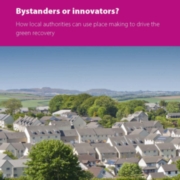How local authorities can use place-making to drive the green recovery
A new report published by APSE, researched and written by the Town and Country Planning Association (TCPA), is calling for a national enabling strategy to place local government at the heart of a post-pandemic recovery, suggesting that its role in place making will be the core driver to a green recovery.
The report suggests that national economic success cannot be achieved unless this is rooted in more local actions, driving decision making in towns and cities across the UK; particularly as a multiplicity of public policy crises including housing need, climate change and COVID recovery combine to demand a more interventionist role for local councils in shaping local places.
Launching the report, APSE Chief Executive Paul O ‘Brien said, “This governance crisis, which undermines the local council role in place-making, is entirely avoidable. Indeed, funding choices in recent years, coupled with weakening local planning in England, have been proactive choices of the Government for more than a decade.
“If we are to believe commitments to ‘build back better’ or ‘build back greener’ we need to recognise that local councils are fundamental to driving that agenda. This means reinstating their powers and ability to realise a new vision for local areas; one which enhances the local economy, proactively works for a green recovery and enables those developments which will create quality homes, supported by good local infrastructure, including urban greenspace and public transport.”
Speaking about the research, TCPA Chief Executive Fiona Howie added, “Councils are at something of a crossroad on this. They can either accept the status quo, which means being part of an increasingly passive local public sector, reliant on limited private investment and focused on using the limited regulatory powers at its disposal or they can seize the initiative by being more directly involved in shaping the future of their places and communities. Just as they did in the post-war era now could be the time where councils make the seismic differences at a local level.”
The report examines how three different local authorities – Cornwall Council, North Ayrshire Council, and Birmingham City Council – have successfully done this, the different routes they took, and the challenges they faced. We also look to a fourth case study – Wales and its Future Generations Act – to examine how national legislative frameworks can drive and harness local innovation.
The report is also underpinned by a survey of 216 councillors and officers, largely from local authorities in England. This survey focused on identifying the key barriers both groups face in delivering national policy objectives and high-quality places.
The report makes five recommendations:
- An enabling national strategy
A clear national strategy and vision on the objectives of post-pandemic recovery and the role to be played by local government is a vital foundation for local action.
- Support for innovation
National governments have an extremely important role to play in supporting information sharing and technical support amongst local authorities.
- Support for skills
If local authorities are key to the post-pandemic recovery, then national governments must see funding skills and capacity building as equal to ‘hard’ infrastructure investment.
- A moratorium on centralising local powers in England
Despite strong concerns from local government in England, a range of place-making powers continue to be centralised - something most evident in the expansion of permitted development rights. This national shift to the centre has significantly weakened the capacity of local authorities to deliver the positive innovation highlighted in this report. Government should restore the powers it has removed or at least signal a moratorium on further power being removed.
- Encouraging the corporate social responsibility of anchor institutions
Some aspects of enabling local action sit with local anchor institutions like the NHS or Universities. At present, their engagement in local transformation is patchy despite their power to support transformation.
For more information and to download the report click here.
Notes to editors
- APSE is the Association for Public Service, a not-for-profit organisation working with over 300 councils throughout the UK providing advice, support and research on frontline local government services. Contact Mo Baines, Head of Communication and Coordination [email protected] mobile 07971 84515 to arrange for interview or further information or Matt Ellis, APSE Communications Officer on [email protected] tel: 0161 772 1810
- The Town and Country Planning Association www.tcpa.org.uk (TCPA) is an independent campaigning charity calling for more integrated planning based on the principles of accessibility, sustainability, diversity and community cohesion. The TCPA puts social justice and the environment at the heart of the debate about planning policy, housing and energy supply. We inspire government, industry and campaigners to take a fresh perspective on major issues including climate change and regeneration.
- The research is from a study by the TCPA for APSE which was launched on 12 July 2021 at a parliamentary event with Ruth Cadbury MP. This is the seventh research project by the TCPA for APSE, the five previous research reports are Housing the Nation; Homes for all; Building homes, creating communities; Delivering affordable homes in a changing world; Housing for a fairer society; and At a crossroads. Together they provide a detailed overview of the housing and planning policy changes between 2010 and 2020. Each of the research projects can be downloaded for free from the APSE website.
- The report is available to download as a PDF on the APSE website.
- For further information, please contact Isaac LeQuesne at the TCPA on [email protected]


.png)



.png)